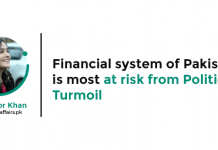Pakistan is very close to achieving FATF benchmarks. Still, the disillusionment pertains as Dr. Marcus has acknowledged Pakistan’s “significant progress”, but FATF hasn’t softened its stance towards Pakistan and enjoins Pakistan to “do more” time and again. There are 12 countries on the FATF grey list and two on the blacklist (Iran and North Korea). Pakistan has been on the FATF grey list since 2018, and noticeably now it is in a position to escape out of the list in the coming plenary session that is to be held tentatively in June 2021.
So far, Pakistan has made progress with 24 out of 27 points in the FATF action plan under the watchdog’s monitoring. The three action points that remain are (i) demonstrating that TF investigations and prosecutions prosecute individuals and organizations operating on behalf of or under the behest of the identified persons or entities, (ii) demonstrating that TF prosecutions result in effective, proportionate, and dissuasive penalties, and (iii) demonstrating effective enforcement of targeted financial sanctions against the designated persons or entities.
The bar to effective implementation of the action plan is the structural and framework deficiencies. Corruption is a money laundering predicate crime, and it has deep roots in almost all the countries of South Asia (India, Bangladesh, Pakistan, and Sri Lanka). Corruption is pervasive in Pakistan’s economy, and the reforms and laws enacted to combat TF and ML have been ineffective due to the fraught corrupted environment. Furthermore, Pakistan’s geographical and unstable borders make it more vulnerable to terror funding and raise the possibility of cash smuggling in Pakistan. With that, the financial culture of Pakistan holds half formal economy and half informal economy. The domestic, real estate, precious gem/jewelry, and economic sectors are commonly used to launder illicit funds from predicate crimes. Formal and informal networks are used to transfer illegal profits. The National Risk Assessment (NRA), most salient of all, lacks a thorough examination of risks and vulnerabilities, and its coverage is limited, with discrepancies in key risk areas.
Pakistan is meeting the requirements of the action plan steadily and efficiently. Still, it appears that the politics of the men sitting in the arena of parliament is void of the understanding of economic depression and repercussions of Pakistan’s position on the grey/ blacklist. As a student of politics and public relations, it is extremely intimidating to me to see the parliamentarians and legislators giving speeches at the floor holding the stance that the government is giving away the sovereignty of the country to International Organizations like FATF and is not focusing on the poverty and inflation in the country hence depicting that they are unconscious and clueless about the economic fragility of Pakistan. Apprehending Pakistan’s critical times to get out of the grey list is way more significant than anything else for the economy and inflation in the country. Still, this concept seems incomprehensible to the politicians of Pakistan.
Who cannot decipher what Pakistan will be facing if it doesn’t comply with FATF watchdog’s benchmarks or, in the worst-case scenario, happens to be on the blacklist! Economic sanctions inflicted by the organization will jeopardize the financial sector with inflation and massive fall in Pakistani rupee (which, if I delineate), if the situation gets worse, you will need a million rupees to travel from Islamabad to Lahore and a thousand rupees to purchase a single loaf of bread (in the state of Pakistan being on the blacklist). Besides, international pressure will mount, which will be disturbing the international ties of the country. If the economic sanctions pertain, they will make it cumbersome for the globe to do business with Pakistan. The global financial exclusion will unquestionably lead Pakistan to put its hand out in front of its friends (China, Turkey, and Saudi Arabia) time and again to shore up its economy.
Reading between the lines, one may find international actors like China, India, and the USA looking forward to the FATF decision in June 2021. One never knows what the international actors are looking into or what they are having in their minds, so one has to follow the concept of plausible deniability. China uses the road and sea lanes of Pakistan for efficient trade and navigation purposes through its CPEC project. For that reason, Beijing is assisting Islamabad in countering terrorism in its Northern and Southern parts. Suppose the position of Pakistan remains the same on the FATF list after the watch dog’s assessment. In that case, presumably, the diplomatic anxiety between the countries will escalate as China is already menaced by the BLA attacks on the CPEC convoys and terror activities by Uyghur’s militant in south China. Beijing’s position is clear; it demands Pakistan to act more in countering terror entities and financing with China’s support.
The other elephant in the room is India; the act of suppressing Pakistan at all international forums by overt or covert diplomacy of India is not hidden to the global community in the context of asymmetric and mercurial bilateral relations of the countries. India had fabricated a terror attack in Indian administrative Kashmir (The Pulwama attack) in the past, just before the 2019 FATF plenary session, to highlight Pakistani terrorism for the intention of seeing Pakistan on the blacklist. Still, its delusion was shattered soon after FATF’s decision. However, it did harm the reputation of Pakistan. Delhi seeks to isolate Islamabad from the international community with its diplomatic prowess and powerful lobby. Therefore, it is expected that India may vote against Pakistan in the plenary, and it is useless to desire the support of our eastern neighbor not only at this forum but also at any other forum.
Besides, the USA, with its new administration, seems to play a superficial role in determining the status of Pakistan in the listing of FATF as right now Biden is conscious of the fact that grey-listing of Pakistan will jeopardize the ongoing collaboration in the Afghan peace process to secure the exit and also the economic sanctions on Pakistan would, in turn, affect Washington’s economy.
Unequivocally, Pakistan has undergone a good shift in the country’s security and strategic calculus to end the coercive chapter of FATF economic constraints and is optimistic about getting out of the grey list in the coming session. However, Pakistan will remain under the monitoring of the FATF watchdog, which will keep an eye on the reforms’ sustainability. Pakistan has to prove itself a worthy companion to the globe for countering terrorism through improved legislation and prosecutions.
Pakistan will hopefully get out of the grey list but the battle will not end here. Concluding the discourse here with a few points to ponder: Will the lifting of sanctions on Pakistan alter the strategic priorities of the globe and states’ benign disengagement with Pakistan? Do the economic sanctions against Iran have a pessimistic impact on foreign investment and the economic interest of the two great powers, India and China at the Chabahar port? Will Pakistan’s removal from the grey list alter (or alleviate) the non-investment in Pakistan for real?




